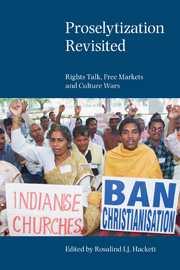Book contents
- Frontmatter
- Contents
- Preface and acknowledgements
- Contributors
- Revisiting Proselytization in the Context of Rights Talk, Free Markets and Culture Wars
- Section I
- Section II
- The Changing Face of Christian Proselytizing: New Actors from the Global South
- Muslim Apostasy, Christian Conversion, and Religious Freedom in Egypt
- Seeing is More Than Believing: Posters and Proselytization in Nigeria
- Section III
- Section IV
- Section V
- Index
Muslim Apostasy, Christian Conversion, and Religious Freedom in Egypt
from Section II
- Frontmatter
- Contents
- Preface and acknowledgements
- Contributors
- Revisiting Proselytization in the Context of Rights Talk, Free Markets and Culture Wars
- Section I
- Section II
- The Changing Face of Christian Proselytizing: New Actors from the Global South
- Muslim Apostasy, Christian Conversion, and Religious Freedom in Egypt
- Seeing is More Than Believing: Posters and Proselytization in Nigeria
- Section III
- Section IV
- Section V
- Index
Summary
Introduction
In early twentieth century Egypt, American Protestant missionaries evangelized actively among Muslims while working under the protective influence of British imperialism. However, missionaries encountered local resistance to their work in the form of what they called the Islamic apostasy principle (Zwemer 1924), the doctrine that conversion into Islam was acceptable but that conversion out was forbidden. They also encountered resistance in the form of Islamist and nationalist opposition, which intensified in the interwar period. Occasionally Muslims did convert to Christianity under missionary sponsorship, though converts came under heavy communal pressures to recant, and faced stiff social sanctions, including disinheritance, ostracism, assault, forced marriage, and sometimes death threats from their kin (Watson 1906; Watson 1907, 174–77, 179, 240; Gairdner 1909, 187–88). These barriers of Islamic doctrine and custom, combined with a mounting array of legal and organizational obstacles, help to explain why Protestant missionaries in Egypt could only point to two hundred converts from Islam by 1953. The vast majority of Egyptian converts to Protestantism came instead from Coptic Orthodox Christian backgrounds (Philips 1953, 7).
This article looks at the history of American missionary activity in Egypt in order to consider the development of conflicting ideologies of religious liberty, conversion, and individual rights. It studies how and why American missionaries emerged as such strong and vocal supporters of universal religious liberty, even while they sought to articulate a platform for what one might call the “appropriate means” or ethical standards of proselytization (Kao, this volume).
- Type
- Chapter
- Information
- Proselytization RevisitedRights Talk, Free Markets and Culture Wars, pp. 139 - 166Publisher: Acumen PublishingPrint publication year: 2008



